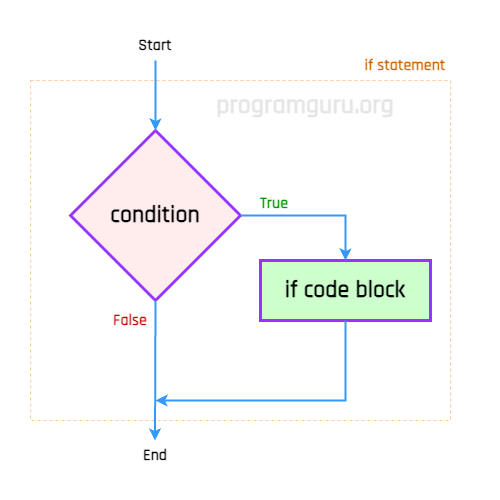If Statement in C
In this tutorial, we will learn about if statements in C. We will cover the basics of conditional execution using if statements.
What is an If statement
An if statement is a conditional statement that executes a block of code if a specified condition is true.
Syntax
The syntax for the if statement in C is:
if (condition) {
// Code block to execute if condition is true
}The if statement evaluates the specified condition. If the condition is true, the code block inside the if statement is executed; otherwise, it is skipped.
The following is the flowchart of how execution flows from start to the end of an if statement.

Example 1: Checking if a Number is Even
- Declare an integer variable
num. - Assign a value to
num. - Use an if statement to check if
numis even. - Print a message indicating whether
numis even or not.
C Program
#include <stdio.h>
int main() {
int num = 10;
if (num % 2 == 0) {
printf("%d is even.\n", num);
}
return 0;
}Output
10 is even.
Example 2: Checking if a Character is a Vowel
- Declare a character variable
ch. - Assign a value to
ch. - Use an if statement to check if
chis a vowel. - Print a message indicating whether
chis a vowel or not.
C Program
#include <stdio.h>
int main() {
char ch = 'a';
if (ch == 'a' || ch == 'e' || ch == 'i' || ch == 'o' || ch == 'u' ||
ch == 'A' || ch == 'E' || ch == 'I' || ch == 'O' || ch == 'U') {
printf("%c is a vowel.\n", ch);
}
return 0;
}Output
a is a vowel.
Example 3: Checking if a Number is Positive
- Declare an integer variable
num. - Assign a value to
num. - Use an if statement to check if
numis positive. - Print a message indicating whether
numis positive or not.
C Program
#include <stdio.h>
int main() {
int num = -5;
if (num > 0) {
printf("%d is positive.\n", num);
}
return 0;
}